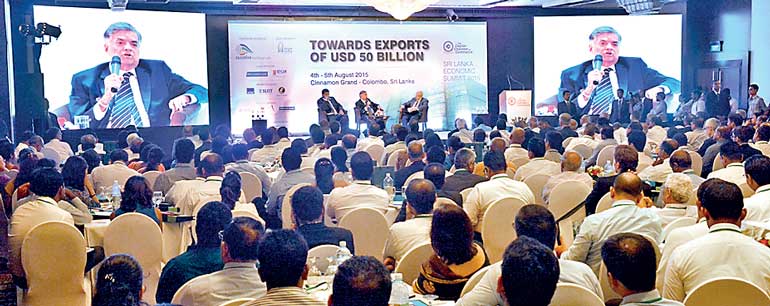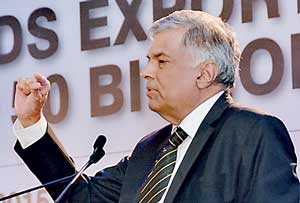Wednesday Feb 18, 2026
Wednesday Feb 18, 2026
Wednesday, 5 August 2015 00:46 - - {{hitsCtrl.values.hits}}

By Uditha Jayasinghe
Prime Minister Ranil Wickremesinghe dished out tough love to the private sector yesterday, calling on them to “bite the bullet” to push through crucial reforms to improve competitiveness and the overall business environment for growth.
Addressing the business community at the Economic Summit, which is the flagship forum of the Ceylon Chamber of Commerce, Wickremesinghe outlined detailed plans by his Government to roll back red tape, increase good governance and decrease protectionism. 
He also acknowledged sweeping reforms eyed by the next United National Party (UNP) Parliament post 17 August would require a mindset change by the private sector that would have to move towards doing business in the global marketplace.
He also listed key thrusts of the United National Front for Good Governance (UNFGG) six-month program which included strengthening the economy, strong anti-corruption mechanisms, ensuring freedom and justice, infrastructure development and education reform.
“The topic of this summit, which deals with increasing exports to $ 50 billion, is perfectly aligned with our aim to build a new country in 60 months. We want to create one million jobs in five years. For this we need to be bold, a change of mindset from the private sector. We must form a highly-competitive social market economy based on sustainable development,” he told the gathering, pointing out that “crony capitalism” must give way to reforms.
He also warned: “How some of you will judge, I don’t know… Pain has to be shared if we’re to grow. We can’t talk of import substitution and expect $ 50 billion in exports.”
The Premier insisted the main focus of the new Parliament would be to resolve Sri Lanka’s longstanding ethnic issue and take the country off the United Nations Human Rights Council (UNHRC) radar permanently.
A better international image would assist the country to put in place a corruption-free structure to attract and implement foreign investment. Then the focus will be on high-end, niche-market-oriented exports that will have to take advantage of the big markets close to Sri Lanka, he opined, adding education would be the driver for such progress.
Wickremesinghe urged businesses not to be insecure about tapping into large markets such as India and China with the use of Free Trade Agreements and in the case of the former finalising the long-stagnating Comprehensive Economic Partnership Agreement (CEPA).
“The Government has a role in the economy, which is to lay down rules and enforce them, not to be a competitor. Businesses should not have to ask permission all the time. We are seriously looking at development coordination units at district level so disseminated funds are not wasted; better revenue collection, restructuring of public departments for exports and investment are all being considered,” he said.
Strategies to establish cluster zones to reduce infrastructure costs and pollution were also mentioned by Wickremesinghe, who noted stretches of Horana to Avissawella and Kurunegala as well as two zones for tourism in Weligama and the Cultural Triangle had all been outlined. Kandy and Jaffna will see focussed development as well.
The Western Megapolis project encompassing eight million people will be taken forward to create a mega city to spur development including 500,000 new housing units, the Prime Minister said, recalling countries rely on key capitals to foster growth.
“I have learned from experience that it’s easier to keep kids in school than make corrections later. Education has to be a key driver in this process, especially since we have a rapidly-ageing population, which will require a highly-skilled workforce to achieve sustainable development.”
Wickremesinghe was upbeat on Sri Lanka’s chances, reminding “authoritarianism got us nowhere,” and emphasising “we have suffered enough. If we stay behind now, it is by choice. We are capable of it so let’s make a go of it. We will not fail.”
Finance Minister Ravi Karunanayake participating in the panel discussion emphasised Sri Lanka’s improved diplomatic relations with India and Europe could increase trade, including regaining GSP+ and addressing any concerns with CEPA. He also identified the need to link small and medium enterprises to export-oriented businesses and also outlined debt repayment strategies by the Government to focus on reduced interest and longer tenure of loans.
“On average the interest rate of foreign-funded loans is 5.9% but we have found we can get loans for much less now – from Japan, from the World Bank and others.” Broadening the tax net would also be looked at though no revenue targets were mentioned.